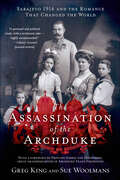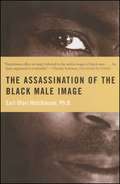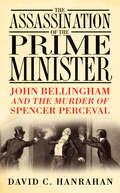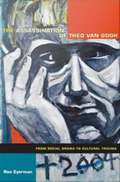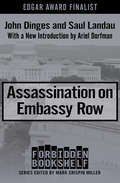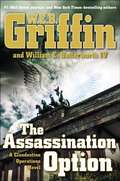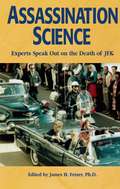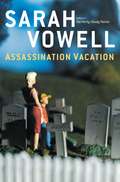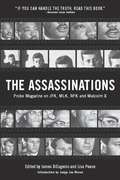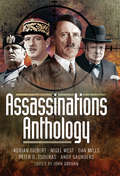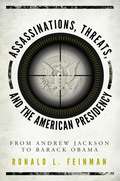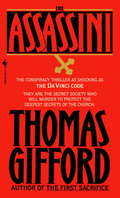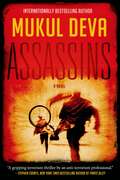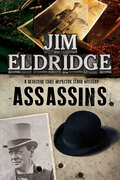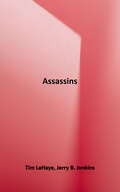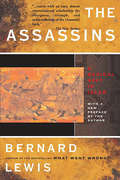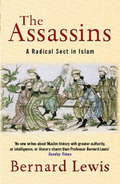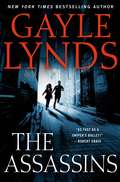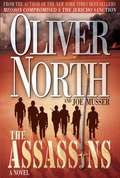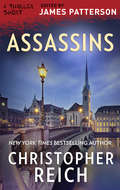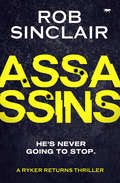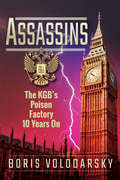- Table View
- List View
The Assassination of the Archduke: Sarajevo 1914 and the Romance That Changed the World
by Greg King Sue WoolmansDrawing on unpublished letters and rare primary sources, King and Woolmans tell the true story behind the tragic romance and brutal assassination that sparked World War IIn the summer of 1914, three great empires dominated Europe: Germany, Russia, and Austria-Hungary. Four years later all had vanished in the chaos of World War I. One event precipitated the conflict, and at its hear was a tragic love story. When Austrian heir Archduke Franz Ferdinand married for love against the wishes of the emperor, he and his wife Sophie were humiliated and shunned, yet they remained devoted to each other and to their children. The two bullets fired in Sarajevo not only ended their love story, but also led to war and a century of conflict.Set against a backdrop of glittering privilege, The Assassination of the Archduke combines royal history, touching romance, and political murder in a moving portrait of the end of an era. One hundred years after the event, it offers the startling truth behind the Sarajevo assassinations, including Serbian complicity and examines rumors of conspiracy and official negligence. Events in Sarajevo also doomed the couple's children to lives of loss, exile, and the horrors of Nazi concentration camps, their plight echoing the horrors unleashed by their parents' deaths. Challenging a century of myth, The Assassination of the Archduke resonates as a very human story of love destroyed by murder, revolution, and war.
The Assassination of the Black Male Image
by Earl Ofari HutchinsonIn The Assassination of the Black Male Image, noted political analyst and media critic Dr. Earl Ofari Hutchinson offers a searing, controversial indictment of our society’s attitudes toward black men. The black male image, he argues, has been battered, maligned, and assaulted by academics, the press, and Hollywood, as well as by some black rappers, comedians, feminists, filmmakers, and novelists—many of whom he accuses of reinforcing, and profiting from, ethnic and sexual stereotypes. Offering both a wide historical perspective and acute insights into such racially charged events as the O. J. Simpson trial, the Clarence Thomas hearings, and the Million Man March, Hutchinson brilliantly counters the image of the black male as a figure entrenched in crime, drugs, and violence. At the same time, he issues a deeply moving call to rethink the way we view African-American men.
The Assassination of the Prime Minister: John Bellingham and the Murder of Spencer Perceval
by David C HanrahanOnly once in history has a British Prime Minister been assassinated. At 5.00 p.m. on Monday, 11 May 1812, John Bellingham made his way to the Houses of Parliament carrying concealed weapons. At 5.15 p.m., as the Prime Minister, the Rt Hon. Spencer Perceval, was making his way across the lobby leading to the House of Commons, Bellingham shot him dead at point-blank range. Bellingham was immediately arrested and put on trial two days later: refusing to plead insanity, he was convicted and hanged before the week was out. Bellingham was neither a revolutionary nor a religious fanatic, but a successful young entrepreneur. What had driven him to commit such a heinous crime? In a story of suspense, revenge and personal tragedy, David C. Hanrahan tells the interwoven stories of Perceval and Bellingham, detailing not just the events of May 1812, but also the two men's histories, and what led one to take the other's life.
The Assassination of Theo Van Gogh: From Social Drama to Cultural Trauma
by Ron EyermanIn November 2004, the controversial Dutch filmmaker Theo van Gogh was killed on a busy street in Amsterdam. A twenty-six-year-old Dutch citizen of Moroccan descent shot van Gogh, slit his throat, and pinned a five-page indictment of Western society to his body. The murder set off a series of reactions, including arson against Muslim schools and mosques. In The Assassination of Theo van Gogh, Ron Eyerman explores the multiple meanings of the murder and the different reactions it elicited: among the Amsterdam-based artistic and intellectual subculture, the wider Dutch public, the local and international Muslim communities, the radical Islamic movement, and the broader international community. After meticulously analyzing the actions and reputations of van Gogh and others in his milieu, the motives of the murderer, and the details of the assassination itself, Eyerman considers the various narrative frames the mass media used to characterize the killing. Eyerman utilizes theories of social drama and cultural trauma to evaluate the reactions to and effects of the murder. A social drama is triggered by a public transgression of taken-for-granted norms; one that threatens the collective identity of a society may develop into a cultural trauma. Eyerman contends that the assassination of Theo van Gogh quickly became a cultural trauma because it resonated powerfully with the postwar psyche of the Netherlands. As part of his analysis of the murder and reactions to it, he discusses significant aspects of twentieth-century Dutch history, including the country's treatment of Jews during the German occupation, the loss of its colonies in the wake of World War II, its recruitment of immigrant workers, and the failure of Dutch troops to protect Muslims in Srebrenica in 1995.
Assassination on Embassy Row (Forbidden Bookshelf #7)
by John Dinges Saul LandauEdgar Award Finalist: The gripping account of an assassination on US soil and the violent foreign conspiracy that stretched from Pinochet&’s Chile to the streets of Washington, DC, with a new introduction by Ariel Dorfman. On September 10, 1976, exiled Chilean leader Orlando Letelier delivered a blistering rebuke of Augusto Pinochet&’s brutal right-wing regime in a speech at Madison Square Garden. Eleven days later, while Letelier was on Embassy Row in Washington, DC, a bomb affixed to the bottom of his car exploded, killing him and his coworker Ronni Moffitt. The slaying, staggering in its own right, exposed an international conspiracy that reached well into US territory. Pinochet had targeted Letelier, a former Chilean foreign minister and ambassador to the United States, and carried out the attack with the help of Operation Condor, the secret alliance of South America&’s military dictatorships dedicated to wiping out their most influential opponents. This gripping account tells the story not only of a political plot that ended in murder, but also of the FBI&’s inquiry into the affair. Definitive in its examination both of Letelier&’s murder and of the subsequent investigations carried out by American intelligence, Assassination on Embassy Row is equal parts keen analysis and true-life spy thriller.
The Assassination Option
by William E. Butterworth W.E.B. GriffinFrom the #1 New York Times- and Wall Street Journal-bestselling author comes the dramatic second adventure in the brand-new Clandestine Operations series about the Cold War, the fledgling Central Intelligence Agency--and a new breed of warrior.In Top Secret, W.E.B. Griffin introduced a remarkable new cast of heroes as they found themselves on the front lines of an entirely different kind of war. Now, these men and women are going to find out what they've really gotten themselves into. James Cronley thought he had done well--he didn't know he'd done this well.His first successful mission for the about-to-be-official new Central Intelligence Directorate has drawn all kinds of attention, some welcome, some not. On the plus side, he's now a captain; promoted to Chief, DCI, Europe; and in charge of a top secret spy operation. On the minus side, a lot of people would like to know about that operation, including not only the Soviets, but his own Pentagon, as well as a seething J. Edgar Hoover.Cronley knows that if just one thing goes wrong, he's likely to get thrown to the wolves. As if that weren't enough pressure, complications are springing up on all sides. He's discovered a surprising alliance between the former German intelligence chief and, of all things, the Mossad. A German family that Cronley never knew he had has suddenly, and suspiciously, emerged. And he's due for a rendezvous with an undercover agent against the Soviets known only as Seven K.It's when he meets Seven K that he gets the real surprise.
Assassination Science
by Ph.D. James H. FetzerIf you have ever been tempted to believe that President Kennedy was killed by a lone,demented gunman named Lee Harvey Oswald, then Assassination Science is the one book which will convince you, beyond any reasonable doubt, that there was indeed a conspiracy and a cover-up. Completely lacking the wild speculation that have marred some books on the shooting of JFK, Assassination Science sticks to the hard facts, interpreted by medical and scientific expertise.
Assassination Vacation
by Sarah VowellSarah Vowell exposes the glorious conundrumsof American history and culture with wit, probity, and an irreverent sense of humor. With Assassination Vacation, she takes us on a road trip like no other -- a journey to the pit stops of American political murder and through the myriad ways they have been used for fun and profit, for political and cultural advantage. From Buffalo to Alaska, Washington to the Dry Tortugas, Vowell visits locations immortalized and influenced by the spilling of politically important blood, reporting as she goes with her trademark blend of wisecracking humor, remarkable honesty, and thought-provoking criticism. We learn about the jinx that was Robert Todd Lincoln (present at the assassinations of Presidents Lincoln, Garfield, and McKinley) and witness the politicking that went into the making of the Lincoln Memorial. The resulting narrative is much more than an entertaining and informative travelogue -- it is the disturbing and fascinating story of how American death has been manipulated by popular culture, including literature, architecture, sculpture, and -- the author's favorite -- historical tourism. Though the themes of loss and violence are explored and we make detours to see how the Republican Party became the Republican Party, there are all kinds of lighter diversions along the way into the lives of the three presidents and their assassins, including mummies, show tunes, mean-spirited totem poles, and a nineteenth-century biblical sex cult.
The Assassinations
by Lisa Pease James Dieugenio"Probing deep into four hidden histories... the material released should dispel any notions of 'lone nuts' or coincidence... These articles cut a clear path through the thick jungle of disinformation that has grown around these events and expose the truly hideous teratomas that thrive and bloom under the canopy of 'national security.'"--New York Press
Assassinations Anthology: Plots and Murders That Would Have Changed the Course of WW2
by Adrian Gilbert Nigel West Dan Mills Peter G. Tsouras Andy SaundersA fascinating look at what might have happened had historical assassination attempts succeeded. If Hitler had died at any stage in the Second World War, would Germany have immediately sued for peace, or would the generals have taken over and fought a far more practical war than the obdurate Führer? Equally intriguing is the possible failed assassination attempt on General de Gaulle on British soil. Who, one wonders, was behind that scheme, and how would Anglo-French relations have developed if he had been killed? In Assassinations Anthology, a number of well-known authors and historians look at past events where key individuals were involved in either attempts on their lives, or strange incidents occurred which, had they led to their deaths, might have radically affected the outcome of the war. Events surrounding Hitler and Operation Valkyrie, Stalin and Jan Smuts are investigated, as well as the peculiar circumstances relating to the theft of a valuable Gainsborough painting. Just how great a role did the Government&’s Chief Whip, David Margesson, play in persuading the MPs to accept the unpopular Winston Churchill as Prime Minister, and what would have happened if Margesson had been killed when the Gainsborough disappeared? It is fascinating stuff. Grounded in actual events, the various scenarios portrayed in this collection examine the likely chain of events that would have followed if the assassination attempts had succeeded. A few inches, a few minutes—that was all the difference between life and death, and between the past that we know and one that we can only imagine.
Assassinations, Threats, and the American Presidency: From Andrew Jackson to Barack Obama
by Ronald L. FeinmanThroughout American history, Presidents and Presidential candidates have faced countless assassination threats and attempts on their lives. These threats have extended not only to sitting Presidents and candidates but also to Presidents-elect and former Presidents. Assassinations, Threats, and the American Presidency: From Andrew Jackson to Barack Obama walks through Presidential history, looking at the countless assassination threats and attempts that have occurred throughout history. Historian Ronald L. Feinman discusses the Presidencies of sixteen Presidents, as well as three important candidates and five living Presidents today, and how they were directly threatened with assassination, ranging from the first known threat to Andrew Jackson in 1833, to threats to Barack Obama in late 2014. All nineteen of these Presidents and candidates were threatened with assassination--six being killed, three wounded, and ten unhurt. Additionally, he reveals information about some failed attempts, which, had they been successful, could have resulted in fifteen different men who would have become President of the United States. Which ones would have been able to fill the responsibilities? Which ones would have been disastrous in the Oval Office? Assassination attempts, both successful and failures have been part of our political culture for over 180 years, and the problem of Presidential security, safety and protection remains a serious problem today. With the President being faced with countless death threats, the Secret Service and FBI are forced to employ all kinds of technological methods to protect our Chief Executive and his family, as well as other top officials in the line of succession. Feinman brings to light how these agencies have grown, both technologically and physically, to counter these attacks. He, also, sheds light on how these threats to our Presidency have devastated, changed, and grown our United States into what it is today.
The Assassini
by Thomas GiffordIt is 1982. In the Vatican, priestly vultures gather around the dying Pope, whispering the names of possible successors. In a forgotten monastery on Ireland's gale-swept coast, a dangerous document is hidden, waiting to be claimed. And in a family chapel in Princeton, New Jersey, a nun is murdered at her prayers. Sister Valentine was an outspoken activist, a thorn in the Church's side. When her brother, lawyer Ben Driskill, realizes the Church will never investigate her death, he sets out to find the murderer himself--and uncovers an explosive secret.The Assassini. An age-old brotherhood of killers. Once they were hired by princes of the Church to protect it in dangerous times. But whose orders do they now obey?The Assassini marks the triumphant retum of a master at the peak of his powers--the first novel in more than a decade from the acclaimed author of The Wind Chill Factor.
Assassins
by Mukul DevaThe gripping sequel to Weapon of Vengeance, Assassins is a searing thriller that combines family saga with international politics and terrorism Seven years after they conspired to kill Pakistani politician Benazir Basheer, two men, Pakistani Premier Asif Zardosi and ex-dictator General Pervaiz Masharrat, will reach Delhi on the very same day. Also converging on Delhi is assassin Leon Binder, who is seeking to bring down the curtain on a deadly three-decades-long career with a spectacular double hit. Standing between Leon and his targets is one man: retired Inspector General of Police Ravinder Singh Gill. Still reeling from the death of his daughter, Ruby, whose he failed to prevent from destroying the Israeli-Palestinian peace summit, Ravinder’s self-confidence has been shattered. To make matters worse, his mission becomes immediately treacherous when his most senior officer is found brutally tortured and murdered; it is obvious Ravinder's team has been penetrated. Will Ravinder be able to stop Leon and prevent disaster in India and Pakistan?
Assassins: A British Mystery Series Set In 1920s London (The Detective Chief Inspector Stark Mysteries #1)
by Jim EldridgeA professional assassin stalks London&’s streets in the first historical mystery featuring Scotland Yard&’s Detective Chief Inspector Stark. London, 1921. The Great War has recently ended and tensions in England are high. Now, prominent Cabinet minister Lord Amersham has been shot dead outside his Regent&’s Park home. With two bullets to the chest and one to the forehead, all signs point to a professional hit. Charged with solving one of the most sensitive and high-profile cases Scotland Yard has ever faced, DCI Paul Stark is under pressure to get the job done quickly. Amersham&’s colleague Winston Churchill, Secretary of State for the Colonies, is convinced the Bolsheviks are responsible. Stark&’s contemporaries at Special Branch believe there&’s a connection to Government talks about Irish Home Rule. And others believe the motive could be connected to Lord Amersham&’s rather scandalous private life . . . When a second crime takes place—another murder committed by an expert marksman at close range—the case takes a terrifying turn and puts Stark right in the middle of an international crisis. &“Besides providing interesting nuggets of history, Eldridge depicts his lead characters with complexity and compassion, auguring well for this series kickoff.&” —Kirkus Reviews
Assassins: Antichrist (Left Behind, #6)
by Tim Lahaye Jerry B. JenkinsIn the most explosive episode yet in the continuing drama of those left behind, the Tribulation Force hurtles toward the four murders foretold in prophecy. Antichrist himself is prophesied to suffer a lethal head wound. As a supernatural horde of 200 million demonic horsemen slays a third of the remaining population, the Tribulation Force prepares for a future as fugitives. Yet another Force member dies, and others join as crises draw them around the globe.
Assassins: Assignment: Jerusalem, Target: Antichrist (Left Behind #Book Six)
by Tim LaHaye Jerry B. JenkinsAre you ready for the moment of truth? Mass disappearances - Political crisis - Economic crisis - Worldwide epidemics - Environmental catastrophe - Military apocalypse And that's just the beginning . . .of the end of the world. The 12 books in the series by New York Times best-selling authors Tim LaHaye and Jerry B. Jenkins cover the events of biblical prophecy surrounding the rapture and the seven years known as the tribulation that follows. Assassins: Assignment: Jerusalem, Target: Antichrist The members of the Tribulation Force face their most dangerous challenge. As international fugitives, they struggle to find supplies for safe houses around the world. In despair over so many lost lives, Rayford Steele and Buck Williams make plans to dethrone Nicolae Carpathia and expose his plan to become the ruler of the world. Many believers want him stopped, but who will fulfill Scripture and help bring about the Antichrist's death?
The Assassins: A Redical Sect in Islam
by Bernard LewisThe Assassins is a comprehensive, readable, and authoritative account of history's first terrorists. An offshoot of the Ismaili Shi'ite sect of Islam, the Assassins were the first group to make systematic use of murder as a political weapon. Established in Iran and Syria in the eleventh and twelfth centuries, they aimed to overthrow the existing Sunni order in Islam and replace it with their own. They terrorized their foes with a series of dramatic murders of Islamic leaders, as well as of some of the Crusaders, who brought their name and fame back to Europe. Professor Lewis traces the history of this radical group, studying its teachings and its influence on Muslim thought. Particularly insightful in light of the rise of the terrorist attacks in the U. S. and in Israel, this account of the Assassins--whose name is now synonymous with politically motivated murderers--places recent events in historical perspective and sheds new light on the fanatic mind.
The Assassins: A Radical Sect in Islam
by Bernard LewisThe history of an extremist Islamic sect in the 11th-12th centuries whose terrorist methods gave the English language a new word: assassin.The word 'Assassin' was brought back from Syria by the Crusaders, and in time acquired the meaning of murderer. Originally it was applied to the members of a Muslim religious sect - a branch of the Ismailis, and the followers of a leader known as the Old Man of the Mountain. Their beliefs and their methods made them a by-word for both fanaticism and terrorism in Syria and Persia in the 11th and 12th centuries, and the subject of a luxuriant growth of myth and legend.In this book, Bernard Lewis begins by tracing the development of these legends in medieval and modern Europe and the gradual percolation of accurate knowledge concerning the Ismailis. He then examines the origins and activities of the sect, on the basis of contemporary Persian and Arabic sources, and against the background of Middle Eastern and Islamic history. In a final chapter he discusses some of the political, social and economic implications of the Ismailis, and examines the significance of the Assassins in the history of revolutionary and terrorist movements.
The Assassins: A Radical Sect in Islam
by Bernard LewisThe history of an extremist Islamic sect in the 11th-12th centuries whose terrorist methods gave the English language a new word: assassin.The word 'Assassin' was brought back from Syria by the Crusaders, and in time acquired the meaning of murderer. Originally it was applied to the members of a Muslim religious sect - a branch of the Ismailis, and the followers of a leader known as the Old Man of the Mountain. Their beliefs and their methods made them a by-word for both fanaticism and terrorism in Syria and Persia in the 11th and 12th centuries, and the subject of a luxuriant growth of myth and legend.In this book, Bernard Lewis begins by tracing the development of these legends in medieval and modern Europe and the gradual percolation of accurate knowledge concerning the Ismailis. He then examines the origins and activities of the sect, on the basis of contemporary Persian and Arabic sources, and against the background of Middle Eastern and Islamic history. In a final chapter he discusses some of the political, social and economic implications of the Ismailis, and examines the significance of the Assassins in the history of revolutionary and terrorist movements.
The Assassins (The\judd Ryder Bks. #2)
by Gayle LyndsSix master assassins -- each a legend in the dark corners of international espionage -- band together to steal a fortune from the middle of a war zone. But the mission goes tragically wrong, and they retreat into the shadows. Now THE ASSASSINS are back. Former military spy Judd Ryder is walking to his D.C. home when he spots a man coming out of his row house who looks like Ryder and is wearing his clothes. As Ryder slows to follow, the imposter is killed in a hit-and-run that's no accident. Was the man the intended victim, or was it Ryder himself? Soon Ryder learns that the key to the mysterious events of the past and to his double's murder is an infamous Cold War assassin, the Carnivore. Two of the last people to see the Carnivore were Ryder and CIA trainee Eva Blake, and someone is using them to lure him out. From Washington D.C. to Marrakech and Baghdad, the assassins wage a final battle -- this time against one another -- fighting for their reputations and Saddam Hussein's long-missing billion-dollar fortune. In the end, only one can be left standing. Caught in the crossfire, Judd and Eva go on the run while desperately unraveling the tangled past and battling not only for their lives, but for their destinies.
The Assassins: A Novel
by Oliver L. North Joe MusserThis book follows: The Jericho Sanction. Years after the September 11 th attacks on America, the world awakes one morning to the news that Islamic Jihadists have assailed multiple targets in Saudi Arabia, destroying oil-pumping equipment, crippling pipelines, and assassinating most of the royal family. Inflation rocks the world's financial markets. The normal rules no longer apply. In a closed session of Congress an "Assassination Bill" is introduced. General Peter Newman is assigned to head a new "Threat Mitigation Unit," and he is given authority to recruit and train up to 100 specialists for the ominous task at hand-to assassinate terrorists. Soon, intelligence shows Iranians are planning to attack America, and as Newman and his team are dispatched, a chase around the world ensues. But the enemy's backup plan involves hijacked airplanes with nuclear weapons targeting najor American cities.
Assassins
by Christopher ReichExperience a heart-pumping and thrilling tale of suspense!Originally published in THRILLER (2006),edited by #1 New York Times bestselling author James Patterson.In this tight Thriller Short, New York Times bestselling writer Christopher Reich revisits his hero Nick Neumann, whom readers first met in Numbered Account. After all these years, Nick is back on Swiss soil with a new mission and a new occupation. In his clandestine world, anonymity is key, so it has to be more than coincidence when Nick encounters his arch nemesis, the Greek, at a restaurant. Members of their elite profession are rare, so the chance to assess one another’s skills over dinner and a bottle of champagne is an opportunity these men can’t pass up. How they each perform will determine which one makes it home and which one is eating his last meal.Don’t miss any of these exciting Thriller Shorts:James Penney’s New Identity by Lee ChildOperation Northwoods by James GrippandoEpitaph by J. A. KonrathThe Face in the Window by Heather GrahamKowalski’s in Love by James RollinsThe Hunt for Dmitri by Gayle LyndsDisfigured by Michael Palmer and Daniel PalmerThe Abelard Sanction by David MorrellFalling by Chris MooneySuccess of a Mission by Dennis LyndsThe Portal by John Lescroart and M. J. RoseThe Double Dealer by David LissDirty Weather by Gregg HurwitzSpirit Walker by David DunAt the Drop of a Hat by Denise HamiltonThe Other Side of the Mirror by Eric Van LustbaderMan Catch by Christopher RiceGoodnight, Sweet Mother by Alex KavaSacrificial Lion by Grant BlackwoodInterlude at Duane’s by F. Paul WilsonThe Powder Monkey by Ted BellSurviving Toronto by M. Diane VogtAssassins by Christopher ReichThe Athens Solution by Brad ThorDiplomatic Constraints by Raelynn HillhouseKill Zone by Robert LiparuloThe Devils’ Due by Steve BerryThe Tuesday Club by Katherine NevilleGone Fishing by Douglas Preston and Lincoln Child
Assassins (The Ryker Returns Thriller #2)
by Rob SinclairThe bestselling author of Renegade delivers a spy thriller that’s “got the action . . . the blood and guts . . . and the twists you just don’t see coming” (David’s Book Blurg).Stalking the streets of Prague, James Ryker is on the hunt for justice when he hears a news report of a murder in rural England. Big problem. He knows the victim. Ten years ago, in Qatar, Ryker led a team of assassins to kill him. He thought they had.So how has a man Ryker thought dead for over a decade suddenly resurfaced?Traveling across the globe, Ryker sets off on a quest to discover the truth from that fateful night in Qatar. When he realizes that his old team members are now under threat from a ruthless female assassin, he knows his problems have only just started.In a race against time, Ryker must work out who is behind the killings and evade the assassin before he becomes the next victim . . . Praise for Renegade“An adrenaline shot right to the heart.” —The Best Thriller Books“Ryker is a brilliantly believable character to get behind . . . Great fun—and an easy read that kept me gripped and racing through the pages.” —The Page Is Printed“With mounting suspense, relentless action and a fair amount of violence, I felt pretty exhausted by the end! . . . entertaining, action-packed and thrilling, a real page-turner.” —The Curious Ginger Cat
Assassins: The KGB's Poison Factory 10 Years On
by Boris VolodarskyA look at the events surrounding the 2006 poisoning of a former Russian security officer in Great Britain.In November, 1998, Alexander Litvinenko, a former lieutenant colonel of the Russian security service or FSB, along with several former colleagues, publicly stated that their superiors had instigated an assassination attempt on a Russian tycoon and oligarch. Following his subsequent arrest and failed trials, Litvinenko fled to London where, having been granted asylum, he worked as a journalist and writer, as well as acting as a consultant for the British intelligence services.Eight years later, Litvinenko’s past caught up with him when he was assassinated in London. On November 1, 2006, Litvinenko was suddenly taken ill and hospitalized. He passed away twenty-two days later. Significant amounts of a rare, highly toxic element were subsequently found in his body. Before his death, Litvinenko had said, “You may succeed in silencing one man, but the howl of protest from around the world, Mr. Putin, will reverberate in your ears for the rest of your life.”Author Boris Volodarsky, who was consulted by the Metropolitan Police during the investigation and remains in close contact with Litvinenko’s widow, details the events surrounding Litvinenko’s murder. Volodarsky updates the story, referring to the findings of the official British inquiry, on the release of which Prime Minister David Cameron condemned Putin for presiding over “state sponsored murder.”The author proves that the Litvinenko’s poisoning is just one of many. Some of these assassinations or attempted assassinations are already known; others are revealed by him for the first time.
Assassins: The KGB's Poison Factory 10 Years On
by Boris VolodarskyA look at the events surrounding the 2006 poisoning of a former Russian security officer in Great Britain.In November, 1998, Alexander Litvinenko, a former lieutenant colonel of the Russian security service or FSB, along with several former colleagues, publicly stated that their superiors had instigated an assassination attempt on a Russian tycoon and oligarch. Following his subsequent arrest and failed trials, Litvinenko fled to London where, having been granted asylum, he worked as a journalist and writer, as well as acting as a consultant for the British intelligence services.Eight years later, Litvinenko’s past caught up with him when he was assassinated in London. On November 1, 2006, Litvinenko was suddenly taken ill and hospitalized. He passed away twenty-two days later. Significant amounts of a rare, highly toxic element were subsequently found in his body. Before his death, Litvinenko had said, “You may succeed in silencing one man, but the howl of protest from around the world, Mr. Putin, will reverberate in your ears for the rest of your life.”Author Boris Volodarsky, who was consulted by the Metropolitan Police during the investigation and remains in close contact with Litvinenko’s widow, details the events surrounding Litvinenko’s murder. Volodarsky updates the story, referring to the findings of the official British inquiry, on the release of which Prime Minister David Cameron condemned Putin for presiding over “state sponsored murder.”The author proves that the Litvinenko’s poisoning is just one of many. Some of these assassinations or attempted assassinations are already known; others are revealed by him for the first time.
